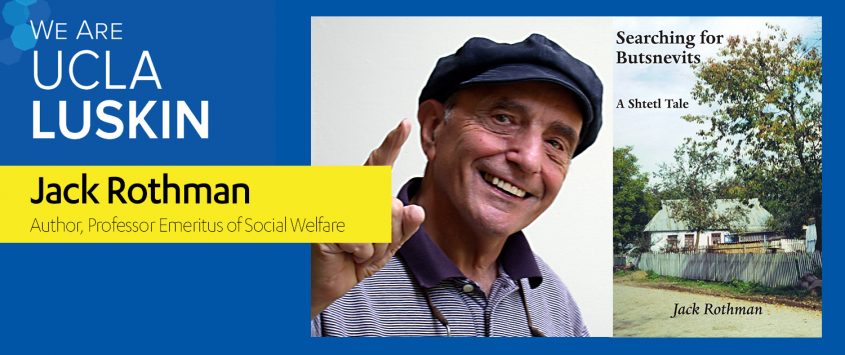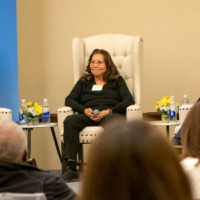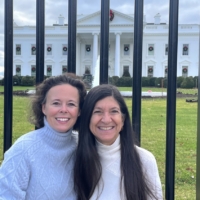The Lost Shtetl In a new book, Professor Emeritus Jack Rothman chronicles his journey to find the forgotten village in Ukraine where his family had lived for generations
By Zev Hurwitz
With the advent of the internet and Google Maps, searching for virtually any town in the world is just a few clicks away. But for Luskin School of Public Affairs Professor Emeritus Jack Rothman, planning a visit to his father’s birthplace, Butsnevits, was a little more challenging. The biggest issue: No map seems to acknowledge the existence of such a place.
In a new self-published book, “Searching for Butsnevits: A Shtetl Tale,” Rothman sets off to find the titular shtetl, a word for a small Jewish village, of which his father would speak fondly about.
After writing some 25 other books with more traditionally academic prose, Rothman’s latest publication takes on a much more personal feel. Described in the introduction as “part autobiography, part social history, and part detective story,” Rothman pieces together clues to the shtetl life of his family in early 20th century Ukraine.
He describes the book as an encounter with the past, with the history of his family and the region, and what has happened since to the people and the place. No Jews are left in the village anymore. They were decimated by the Nazi destruction machine during WW II. Women work the fields now, and men do maintenance and repairs. Most youth leave for work in the cities. And the old Jewish cemetery has no defining walls left and almost all the stones are gone.
“I wanted to tell the story of my trip and what I experienced, and have the reader accompany me on the journey,” Rothman said. “I wanted the reader to learn what I learned when I learned it.”
His interest piqued growing up with a family that referred to Butsnevits as “der haim” (“the home”). As a researcher at UCLA, Rothman plowed through the records at the UCLA Jewish Library and the Los Angeles Museum of the Holocaust, neither providing any hint to the location of Butsnevits.
The book tells how Rothman, in 1995, tacks on a side trip to Ukraine while in Europe for a speaking engagement in Poland. After changing planes in the bustling airport of Frankfurt, Rothman finds himself further and further removed from modern luxury as he teams up with a local tour guide and driver and sets off to Letichev, which a family member had told him was in the general vicinity of Butsnevits. The rural journey continues only through clues such as a beautiful nearby lake and an old mill, and interviews with locals. Rothman writes about staying in Kiev in a hotel with “cardboard simulations of towels” and navigating towns without running water.
In addition to recounting the journey through rural Ukraine, Rothman also sets the journey and the shtetl in question in the context of the Russian Revolution. As made famous by the film “Fiddler on the Roof,” Jewish settlements in Eastern Europe were threatened by attacks called pogroms from anti-Jewish nationals.
Rothman says he typically tries to avoid focus on the tragic nature of large parts of Jewish history.
“I didn’t start off with a strong intention to deal with anti-Semitism,” Rothman said. “The thing I didn’t like about my Jewish education was dwelling on all of the tragedies that took place. I sort of longed for a Jewish history that was a little brighter.”
In writing “Searching for Butsnevits,” Rothman found it impossible not to contextualize the shtetl’s history and decline without taking into account the history of Eastern Europe. There were the Khmelnytsky massacres of 1648, the Czar Alexander III repressive May Laws of 1882, and the Nazi invasion starting in 1939. The chaotic civil war in the region following the Russian Revolution was also an important element of the oppression of Jews.
“The anti-Semitism hit me in the face,” he said of learning the backstory for Butsnevits. “I had to give it a good deal of play.”
Rothman said that he didn’t face any sort of anti-Semitic interactions during his trip and noted that every interaction with locals — save for a xenophobic innkeeper — was very pleasant. The people in the village were honored to have a visitor from America, whose family had lived among them, and gave him the utmost courtesy, he said.
In the second part of the book, Rothman includes a harrowing firsthand depiction of a violent pogrom attack on the shtetl as witnessed by his older cousin, Sally, who lived in Butsnevits as a child. Rothman had relied heavily on Sally’s description of the shtetl prior to his trip in 1995 and included her firsthand account, recorded in 1973, of an attack on the village and her family’s home.
“I thought of Sally’s narrative as simply being documentation of what many, many people experienced. This is an on-the-ground story of the antipathy and violence experienced by Jews and how it caused this family to pick up and leave this place that they had been in for generations.”
Sally, who was 8 when she and her family fled Butsnevits for the United States, was Rothman’s sole source of information about Butsnevits when he was planning his Ukraine trip. Rothman says that his search for the shtetl and learning about shtetl life has given him new admiration for the family that pioneered life in the United States.
“When they came to the United States, they were what people called ‘greenhorns,’” he said. “They spoke only Yiddish and had no education. It was painful for them to learn how to navigate institutions like hospitals and schools.
“They came from a tiny and isolated rural village and crossed a wide ocean into the frenzy and complexity of tumultuous New York City. I don’t know how they did it — surviving and raising families that even the Rotary Club would admire,” Rothman said. “After visiting the postage-stamp-sized Butnevits, in my mind, they skyrocketed from ‘greenhorn’ immigrants to heroes.”
Rothman is a former social welfare professor at UCLA Luskin, where he focused his research on community organizing for social change. (“I was a community organizer before President Obama,” he said with a laugh.) He previously taught at the University of Michigan and has held emeritus status at UCLA since retiring shortly after his visit to Ukraine.
“Searching for Butsnevits: A Shtetl Tale” is available for purchase from Amazon.








Leave a Reply
Want to join the discussion?Feel free to contribute!